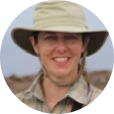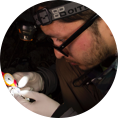As Adriana highlights, it is a long and arduous road to securing a position (let alone a permanent one) in academia after your PhD. But undertaking a plethora of additional activities to boost your employability together with essential training, attending conferences and actually completing your research may seem incredibly daunting. In this post, we discuss one way of potentially doing both your research and broadening your experience: undertaking an overseas lab visit. We are three PhD students who visited the Laboratory of Collective Behaviour of the Max Planck Institute of Ornithology, and explain what our motivations were, how we supported it financially, and most importantly what we gained from it.
What motivated you undertake an overseas lab visit? Lucy: My primary reason for visiting an overseas lab was to have the opportunity to work alongside experts within my specific research area. I was also keen to gain an understanding of how a high ranking research institution works in terms of the main research areas, funding and structure and how these potentially differ from the UK system. José: I was interested in learning how to analyze social structure by employing social network analysis (SNA). After researching the topic, I learned of a PI based in Germany who had written numerous papers on the topic of SNA, and generated packages for analyzing social network data. I thought his lab would be the best place to go to learn how this technique for myself. Grace: As a PhD student, I’m still in the process of gathering information and learning more about my dissertation topic. My overseas lab visit was a way for me to branch out beyond the research scope in my home department and gain a new perspective. I was hoping to use my time overseas to work on a manuscript with the PI of the lab I visited. I also planned to participate in a collective behavior course at the University of Konstanz, Germany. How did you go about organising your visit? Lucy: Organising my visit was a simple email to the head of the lab (who I had met briefly at a conference earlier in the year) asking if I come and do a placement. I was very lucky as they were really accommodating and actually said I should have stayed for longer! José: I kept in touch with the PI of the lab I visited since meeting them some months before. I raised my interest in visiting their lab, to which they were very receptive and interested in realizing this possibility. Grace: Organizing my visit was surprisingly simple. The PI of the lab I visited sent me an initial email asking if I would be interested in coming to visit the lab. I discussed the possibilities with my advisor and department, and everything fell into place. What were you expecting? Lucy: In terms of my expectations, I think I was initially a little nervous and intimidated in terms of the level of research quality that is undertaken both at the lab and the institution itself. It’s safe to say that all these fears were put to rest within the first five minutes of being there when I realised that they are human too – and enjoy tea and cake the same as the rest of us! José: I'm not sure what my expectations were. In general, I tend to integrate very slowly into new spaces and can be more self-conscious knowing that the people around me are very smart and specialized. However, the people in the lab were very kind in sharing tips and talking about research, so it did not take me long to feel comfortable and dare to ask questions. Grace: I was expecting this experience to teach me more about different approaches to studying animal social behaviour (my broad interest). Back home, I’m part of an anthropology department and I study wild primates. In Germany, I visited the Max Planck Institute for Ornithology and the Department of Collective Behaviour at the University of Konstanz. These are two very different fields from anthropology and monkeys, and I wasn’t sure what to expect. Would I be prepared for the types of discussions and topics my new colleagues would have? Would my research be relevant and interesting to them as well? As it turns out – yes! This experience surpassed my expectations by letting me explore my ideas (and new ideas!) through a different lens. It was very rewarding. What did you get out of your visit and how do you plan to use this experience going forwards? Lucy: It was an amazing experience for me and I would thoroughly recommend it to anyone undertaking research and specifically a PhD. I found it really interesting to see how other labs structure their week and the activities they undertake, such as meetings, talks, and a journal club. From my experience I have developed new collaborations, not just within the lab but through external connections of the lab which I foresee to be really useful for my research and future work. I have also taken on board some of the activities and the more general approach to academic life of the lab and implemented these at my own University. For example, as my lab consists of just myself and my supervisors I have established a wider lab consisting of three students from other departments. We all share one or more supervisors and we all work on birds. Though we all know and speak to each other we now have more structured meetings every two weeks which give us the opportunity to help each other stay focused and share information on up-coming conferences, courses and other relevant topics. José: I think that going to an external laboratory is quite useful to take a step back and see your own research from the outside. Personally, this short visit was a great opportunity to learn about the work that is done in a different lab and in the Institute itself. The people at the lab were able to help me resolve some issues I was having with my analyses. The possibility of solving many of my questions person-to-person rather than via email was also very important and allowed me to understand what I could answer with the data from my study system. I think this visit will help a lot to improve what my thesis can bring to the social study of frogs and to my research from now on. Grace: I got so much out of visiting a lab overseas. I went to Germany for almost seven weeks, which was enough time for me to feel integrated into the community and get a broad sense of the research going on at the institutions I visited. To me, the most significant part of my visit was the people I met and the connections I made. It was fascinating to hear from people from such diverse backgrounds. I met researchers from six continents, and across a spectrum of academic fields from physics and computational biology to immunology and architecture. I also had substantial time to devote to advancing my dissertation and pouring into new literature through the guidance of the PI of the lab I visited. We not only worked on the original manuscript we intended to write, but drafted an entirely new second paper! It was extremely productive for me and my degree. I was also able to participate in a collective behaviour course, and worked with master’s degree students on a project studying social networks and food discovery in forest songbirds. I learned new techniques of how to study social behaviour and social networks, as well as how to coordinate and work with a team of students from multiple countries. It was great exposure to study a different organism than my usual primates and I will carry these new skills with me back home. For students or other scientists looking for new and different insights, I highly recommend visiting other labs that might not be in your traditional discipline. You’ll be pleasantly surprised at how much new perspectives will benefit your research. How did you fund your trip? Lucy: My trip was funded through my PhD funders – CENTA (Central England NERC Training Alliance) as part of their innovation funding. This funding supports students wishing to gain experience working at external institutions or businesses. José: I competed for some funds from my university (University of Chile) to make stays abroad and I obtained the funds to make the stay for one month. Grace: My trip was partially funded through the PI of the lab and partially self-funded. I received a fellowship this year (called the Mentoring in Critical Transitions fellowship from UC Davis) to travel back to Germany again. There are lots of smaller grants available to students for travel, etc. that can be easily applied for, especially if you plan to give a presentation at the institution or lab you visit.
0 Comments
Leave a Reply. |
|



